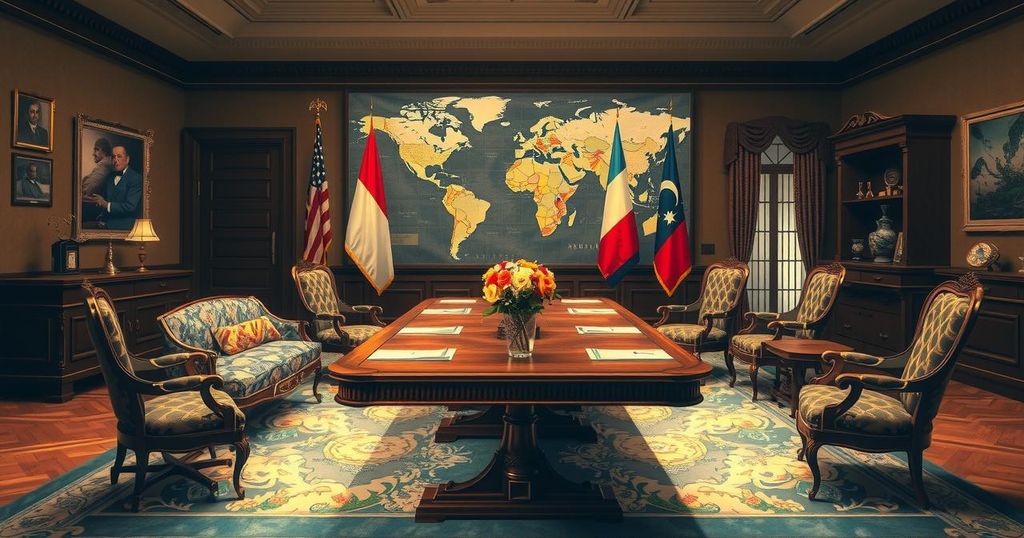Conflicts
Politics
ASIA, AWAMI LEAGUE, BANGLADESH, BLOOD, CHINA, CHRISTOPHER HITCHENS, DEMOCRACY, DHAKA, EAST PAKISTAN, HENRY KISSINGER, HUMAN RIGHTS, HUMAN_RIGHTS, KISSINGER, MEXICO, NIXON, NORTH AMERICA, PAKISTAN, PAKISTANI MILITARY, STATE DEPARTMENT, TERRORISM, UNITED STATES, US, US STATE DEPARTMENT, WASHINGTON
Sophia Klein
Henry Kissinger’s Controversial Role in the Bangladesh Crisis of 1971
Henry Kissinger, a controversial political figure, is criticized for his diplomatic choices during the 1971 Bangladesh genocide. His prioritization of strategic interests over moral imperatives led to significant human suffering. The actions of the US government under Kissinger’s influence, particularly regarding support for the Pakistani military, raise profound ethical questions, further elaborated by Christopher Hitchens in “The Trial of Henry Kissinger.”
Henry Kissinger is recognized as a significant yet contentious figure in 20th-century politics, whose passing in 2023 has revived discussions surrounding his legacy. Supporters view him as a diplomatic genius, while critics label him a war criminal. Christopher Hitchens, in “The Trial of Henry Kissinger,” presents a thorough condemnation of Kissinger’s role in extending the Vietnam War, supporting right-wing coups, and facilitating atrocities across the globe, particularly focusing on the tragic events in Bangladesh.
In 1970, the populace of East Pakistan (modern-day Bangladesh) voted decisively for self-rule, favoring Sheikh Mujibur Rahman and the Awami League. However, this democratic outcome was undermined when the Pakistani military, commanded by General Yahya Khan, initiated Operation Searchlight on March 25, 1971. The military’s campaign was characterized by widespread killings, rapes, and the forced displacement of civilians, with conservative estimates placing the death toll at 300,000, while many assert it exceeded three million.
Archer Kent Blood, the US Consul General in Dhaka, issued some of the earliest and most significant denunciations of the brutal military actions in telegrams sent to Washington. He urged the US government to condemn the atrocities, stating, “Our government has failed to denounce the suppression of democracy. Our government has failed to denounce atrocities…Our government has evidenced what many will consider moral bankruptcy…”. Despite this strong internal protest from numerous diplomats, Kissinger and then-President Nixon dismissed these claims, prioritizing their strategic interests in Pakistan and its relations with China.
Kissinger’s dismissive treatment of the situation is reflected in his label of Bangladesh as a “basket case” during private dialogues, revealing his lack of empathy towards the suffering people. Over the duration of 1971, the Pakistani military’s campaign led to heinous and targeted violence against Bangalee intellectuals and religious minorities, while Kissinger and Nixon maintained support for Pakistan in the face of global condemnation.
Furthermore, internal discussions between Kissinger and Nixon illustrated derogatory views about Bangalees and Indians. Notably, Kissinger received praise from Nixon for his apparent tact during the genocide, despite the evident humanitarian crisis. As millions of refugees overwhelmed India, Kissinger’s actions escalated tensions, culminating in the deployment of the USS Enterprise to intimidate India—a move that ultimately proved ineffective.
The Mukti Bahini, supported by Indian military forces, swiftly overcame Pakistani troops, leading to Bangladesh’s independence on December 16, 1971. Despite this development, Kissinger remained unresolved in his approach, viewing the new government under Mujib as problematic and disregarding the recognition and assistance Bangladesh sought post-war. His brief visit to Dhaka in 1974 did not see him acknowledge US complicity in the atrocities.
In “The Trial of Henry Kissinger,” Hitchens lays forth a compelling argument that links Kissinger’s actions in Bangladesh and other nations to war crimes. His engagement in the overthrow of democratically elected leaders and support for genocidal regimes reveals a troubling view of human lives as expendable in service of geopolitical strategies. As Bangladesh endeavors for formal recognition of its 1971 genocide, the looming query persists: Will history hold Henry Kissinger accountable or allow his parallel criminality to dissipate under the veneer of realpolitik?
In summary, Henry Kissinger’s involvement in the events of 1971 exemplifies a complex intersection of diplomacy and moral compromise. His strategic decisions in relation to the Bangladesh crisis reveal an unsettling disregard for humanitarian principles, exemplified by his support of the Pakistani military during a campaign of mass atrocities. As discussions about Kissinger’s legacy and accountability continue, the historical ramifications of his actions warrant critical examination and reflection, particularly in light of ongoing efforts to recognize the 1971 genocide.
Original Source: www.thedailystar.net








Post Comment